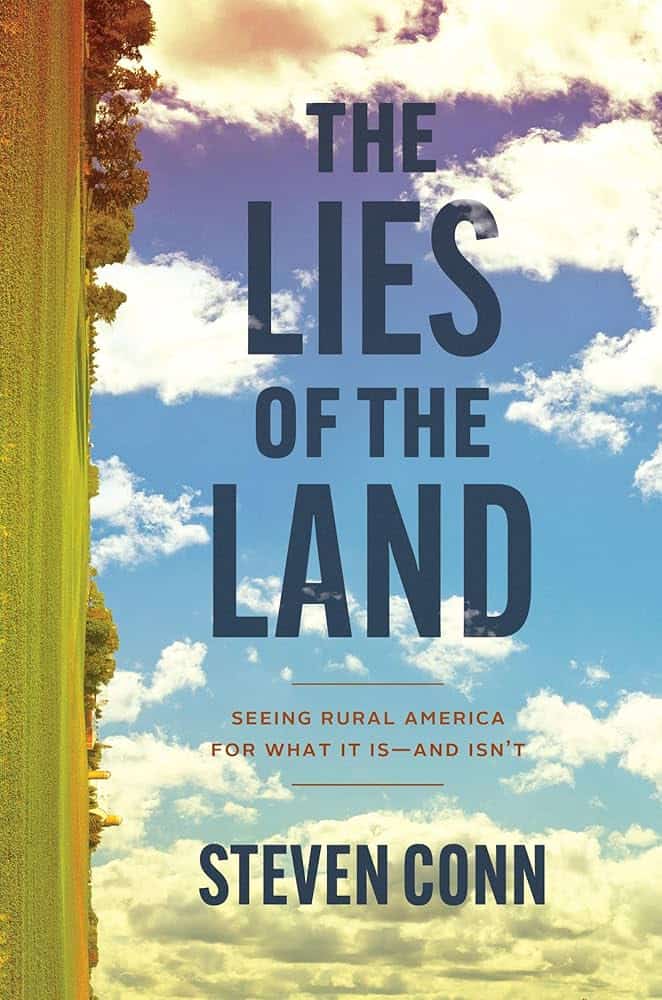By Neal Lemery
A “piercing, unsentimental” history that boldly challenges the idea of a rural American crisis. (The New Yorker)
One of the popular concepts about current American politics and culture is that there is a sharp division between our cities and rural America. Politicians and commentators are quick to explain current events and public policy development in terms of the “haves and have nots” of politics, the economy, and daily life. “Are you with us or with them?” takes advantage of this dichotomy, and we like to think that such a division is obvious. Rural America is poor, neglected, politically neglected, and disadvantaged, so the popular rhetoric claims.
Our political landscape seems to take this viewpoint for granted, as a widely-accepted truth. But, not so, this book argues.
Steven Conn argues to the contrary, with detailed discussions on how America has deeply invested in rural America infrastructure, with massive amounts of federal and corporate capital investments greatly benefitting and improving rural life. He points to massive influxes of military spending, transportation, communication, and education that is the antithesis of neglecting rural America. Instead, these investments are often of greater value and impact than similar (and rarer) investments in cities and suburbs.
He points to the transcontinental railroads, the interstate highway system, the numerous hydroelectrical projects, agricultural subsidies, and land grant universities as just some of the massive influx of “urban” money that has benefitted rural Americans. Recent influxes of federal dollars to build factories and improve infrastructure are flowing primarily to rural America. The suburbanization of rural areas is an underappreciated phenomenon.
“It seems everyone has an opinion about rural America. Is it gripped in a tragic decline? Or is it on the cusp of a glorious revival? Is it the key to understanding America today? Steven Conn argues that we’re missing the real question: Is rural America even a thing? No, says Conn, who believes we see only what we want to see in the lands beyond the suburbs—fantasies about moral (or backward) communities, simpler (or repressive) living, and what it means to be authentically (or wrongheadedly) American. If we want to build a better future, Conn argues, we must accept that these visions don’t exist and never did.
“In The Lies of the Land, Conn shows that rural America—so often characterized as in crisis or in danger of being left behind—has actually been at the center of modern American history, shaped by the same forces as everywhere else in the country: militarization, industrialization, corporatization, and suburbanization. Examining each of these forces in turn, Conn invites us to dispense with the lies and half-truths we’ve believed about rural America and to pursue better solutions to the very real challenges shared all across our nation.” –University of Chicago Press
“A book about rural America is preposterous on its face. There is no such thing as “rural America” because there are many rural Americas, each with its own history, culture, and dynamics. There are “rurals” in every state and in every region of the country,” Conn writes. “Women have long experienced rural life differently than men and have often felt its hardships more acutely, and still do.”
Tourism and recreation, as well as agriculture, are powerful economic and social forces in our various “rural Americas”.
The term “rural-urban divide” is an over-generalization, a cliché without real meaning. Conn urges us to look at the peculiarities of the numerous “rural Americas”, and look for the unique factors and problems, as well as various solutions to improving the lives of our rural populations.
Conn points out that some of the largest corporations in the country have their base in rural areas, that what we romantically envision as “small town businesses” are actually mega-corporations controlling vast wealth and power.
Our response to our sense of rural powerlessness and poverty needs to be redefined, with re-imagined and innovative responses, and new awareness of our country’s historical underpinnings and assumptions.
I found this book informative, provocative, and effective in getting me to challenge some of my assumptions about American history and our culture, and to wonder if the “rural-urban divide” is just a cliché.
Steven Conn is the W. E. Smith Professor of History at Miami University in Oxford, Ohio. He is the author of many books, most recently Nothing Succeeds Like Failure: The Sad History of American Business Schools.


